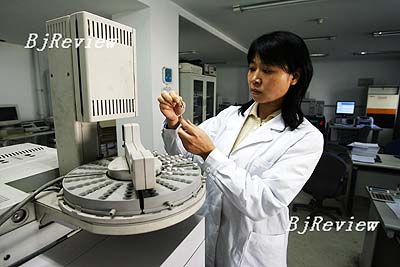|

The China Anti-Doping Agency, set up to replace the 17-year-old China Doping Control Center, was officially unveiled in Beijing on November 12. Between July 27 next year, when the Olympic Village is opened to athletes, and August 24, the last day of the Olympic Games, a total of 4,500 doping tests will be conducted in the building. This number is 25 percent higher than that of the Athens Olympic Games in 2004 and 63 percent higher than at the Sydney Olympics in 2000.
The practice of taking drugs to boost athletic performance is almost as old as competitive sport itself. Speaking ahead of the World Conference on Doping in Sport in November, International Olympic Committee (IOC) President Jacques Rogge said that the fight against doping remained at the top of the agenda of the Olympic Movement. "The IOC itself has adopted a zero-tolerance policy," he said.
Liu Peng, Minister of the General Administration of Sport and President of the Chinese Olympic Committee (COC), announced, "Not a single athlete taking drugs will be allowed to perform at the Beijing Olympics, whether it is Chinese or foreign."
The new anti-doping agency, housed in a three-floor building, has a floor area of 5,500 square meters. According to Du Lijun, Director of the anti-doping agency, it is the largest of the altogether 34 anti-doping agencies in the world. "The second and third floors are all labs," Du said.
"We have bought the most advanced and sophisticated equipment in the world," he said. He added construction of the building and purchases of equipment cost about 80 million yuan ($10.8 million), of which over 20 million yuan ($2.7 million ) was used to import equipment from abroad. "Besides the newly purchased and old equipment, we have also rented some equipment to meet the demand of games-time tests, which is about to arrive in Beijing in April and June next year."
The flooring of the building is made of antistatic material, intended to prevent static accumulating on testing equipment that could lead to misguided results, according to Du.
The guard of the anti-doping agency will be as strict as at any Olympic competition venue during the competition next year. People will need special passes to enter the building. The labs will be guarded by both fences and armed police and installed with around-the-clock monitoring equipment. Vehicles delivering urine and blood samples from athletes will also be guarded by armed police.
"The IOC will inspect the agency by the end of this year and inspection will become quarterly next year," said Du. "The final check will be one month before the opening when the IOC decides whether to sign a contract with us to authorize the agency to conduct all doping tests during the Beijing Olympics."
The trial operation of the agency could start as early as next March and the game-time work will start from the opening day of the Olympic Village.
The doping test procedures initiated by the Beijing Organizing Committee for the Games of the XXIX Olympiad (BOCOG) have passed ISO 9001:2000 quality management system tests. BOCOG will set up 41 doping test stations at all competition venues and the clinic in the Olympic Village. Every test station will have at least two sample-testing laboratories to conduct initial testing procedures.
Horses for the equestrian competition will also be subject to urine tests, which will be conducted by the BOCOG Equestrian Committee in Hong Kong. Samples will be collected in Hong Kong and sent to Beijing for tests.
"Our doping tests are under the leadership of the IOC Medical Commission," said Du. He said during the Olympic Games, the World Anti-Doping Agency (WADA) will station its experts in Beijing. "The IOC will be in charge of monitoring and controlling the results every day," said Wu Moutian, Deputy Director of the China Anti-Doping Agency. "Next year's tests will focus on enhancing accuracy and simplifying procedures."
Currently, China conducts a total of 8,000 doping tests every year, and uncovers an average of less than 30 dope-takers each year. However, during the Beijing Olympic Games, at least 4,500 tests will be conducted within one month, which means more than 200 tests will be conducted on the busiest day. Zhao Jian, another Vice Director of the anti-doping agency, said the estimation of 4,500 tests was conservative as the final number is likely to be more.
BOCOG has selected 200 test staff from nearly 300 applicants through exams, who are currently being trained. "When we received training over 10 years ago, we were trained on how to instruct athletes to remove their trousers. Now we have a lot of people with expertise," said a staff member from the China Anti-Doping Agency, who has worked on doping tests for 17 years.
China's anti-doping work in recent years helped it to shed accusations of lack of effort. The country's doping control work impressed former world anti-doping chief Dick Pound, who said during his Beijing tour in September, "When you look around the world and see what other countries are doing, I think it is safe to say that China is in the vanguard of this."
The China Anti-Doping Agency has also hired 20 doping experts from foreign agencies. "It is not that we need technical backup. As an international norm, hiring foreign experts will help to guarantee the fairness and transparency of the tests," said Wu.
Wu said that anti-doping work has been made more difficult by new technology being used by the dopers. "It is like when our labs(3¥Œ) are good enough to test a spoonful of sugar added to a swimming pool, some people have mastered tricks to make the swimming pool the Pacific Ocean," Wu said. He went on to say that anti-doping technologies need constant updating to fight against drug developers, who are usually top scientists in their fields.
|